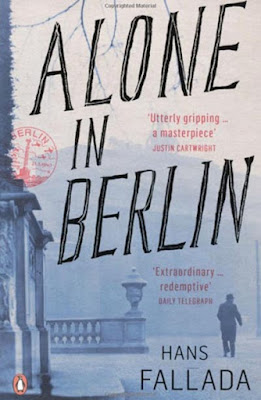Book #95
Berlin, 1940, and the city is filled with fear. At the house on 55 Jablonski Strasse, its various occupants try to live under Nazi rule in their different ways: the bullying Hitler loyalists the Persickes, the retired judge Fromm, and the unassuming couple Otto and Anna Quangel. Then the Quangels receive the news that their beloved son has been killed fighting in France. Shocked out of their quiet existence, they begin a silent campaign of defiance, and a deadly game of cat and mouse develops between the Quangels and the ambitious Gestapo inspector Escherich. When petty criminals Kluge and Borkhausen also become involved, deception, betrayal and murder ensue, tightening the noose around the Quangels' necks.
It’s easy to assume the only people in Germany living in fear during WWII were those pockets of community to whom the Führer was opposed. Here, Fallada ensures we know his reign filled everyone with terror; even the least oppressed man was in danger of incarceration from ill-thought words, associations, or even behaving in a way which was considered odd or suspicious.
Otto and Anna Quangel are two who fall into the least oppressed category. A middle-aged couple living comfortably in Berlin, with no notions of opposing the government, or causing any trouble in the slightest. When they receive news of their son being killed while fighting for the Führer, their thoughts and feelings drift into dangerous, revolutionary areas.
The Quangel’s method of raising hell was almost carried out in the likeness of them both. They wrote postcards bearing radical statements against Hitler and the war, dropping these in stairwells and window sills across the city.
“Mother! The Führer has murdered my son.”
A quiet resistance which seemed to suit them both. And yet, despite the smallness, despite the gentleness with which their deeds were completed, the punishment, if caught, would be the same whether their crimes were quiet or calamitous.
Fallada creates unsettling levels of tension as the novel progresses. He introduces some wonderful characters, taking us away from the Quangels, creating a belief that all will be fine in the end. As we delve further into his pages, the dread increases, the chase quickens, and although it’s entirely terrifying, the staunch refusal of the Quangels to support an inhumane government is wonderfully inspiring.
This is a heartbreaking display of humanity, a close inspection of what it means to be courageous, and what it means to defy those in power, even at the risk of your life. It’s all the more poignant having been based on the true story of Otto and Elise Hampel, who were executed for the same crime in April 1943. A little crime, committed by little people, which created such fear.
Your actions don’t have to be large. Small acts can sometimes have the biggest impact.


